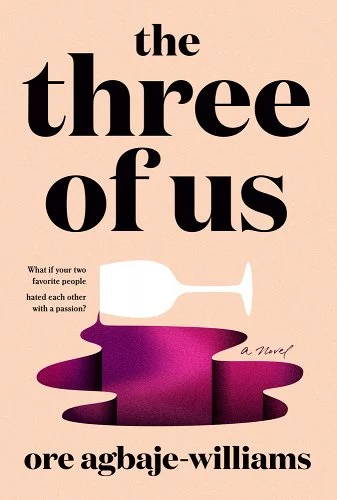There’s a reason that we as a culture have spent the last 20 years debating whether there was enough room on the door for both Jack and Rose in Titanic. Watching Rose let Jack freeze to death in the water instead of just shifting a little bit to the left and letting him on the wardrobe door with her instilled in millions of watchers a profound sense of betrayal for the man she—and we—had grown to love. The way she moved his hand and let him float away when she realized he was dead? Unforgivable. Then again, we do live in a survival-of-the-fittest world, so it makes sense that people will do what they need to get by, including betraying friends, family, or even themselves. And sometimes, we are willing to betray those closest to us for their own good… kind of.
In my debut novel The Three of Us, a wife grapples with the deep-seated animosity between her husband and her best friend. Depending on how you read it, there are betrayals committed by and against all parties, from wife to husband, friend to friend, and maybe even the wife to herself. So in typical Carrie Bradshaw fashion, I couldn’t help but wonder: Which other betrayals in literature have etched themselves into my memory?
Things Fall Apart by Chinua Achebe
If you haven’t read this, one of the most critically acclaimed books of all time, then you absolutely should. Things Fall Apart tells the story of a man loyal to his people and traditions and loyal to a specific idea of himself. Ultimately though, things… fall apart, but the question is whether Okonkwo—the titular character, is betrayed by his people and their unwillingness to fight alongside him, or whether he betrays himself. Personally, I’m still undecided, but read it and see what you think.
You Made a Fool of Death with Your Beauty by Akwaeke Emezi
Akwaeke Emezi’s first romance novel remains one of the wildest books I have ever read. Beyond that, it asks the reader to consider what living for yourself, and not everyone else, could be like and whether it’s worth the risk. In it, betrayals—of others and of your old self—may come, but Emezi urges their readers to consider that life is lived with fewer regrets that way. Without spoiling the book for you, I’ll describe the most explosive betrayal this way: it’s all in the family.
Atonement by Ian McEwan
Two words: Briony Tallis. That’s it.
Honestly, if you know anything about the story—by way of either the film with Keira Knightley and James McAvoy or the book it’s based on by Ian McEwan—you don’t really need much of a play by play of how brutal the betrayal in this book is and what happens when jealousy and—quite literally—a lack of communication take hold of a young and impressionable mind.
Gone Girl by Gillian Flynn
If you’ve read the book or seen the film then you already know: Hell hath no fury like a woman scorned who also has a diary, a terrifying imagination, and the ability to make herself disappear and make it look like you’re the one who did it because she found out you were cheating on her… [*Takes a deep breath.*] The husband and wife at the center of this blockbuster book betray each other in countless ways throughout the narrative. Moral of the story is, if you don’t like each other, just get a divorce. Way easier.
Game of Thrones Series by George R. R. Martin
Ned Stark. Viserys Targaryen. The Red Wedding. Ramsay Bolton. If Harold Pinter hadn’t already taken the title for his great play (which you should also read), this series should also have been called Betrayal, because there were numerous betrayals that literally no one saw coming. If George R. R. Martin has taught us anything—except for how to cultivate extreme levels of patience—it’s that loyalty does not exist in the seven kingdoms. Ever.
The Story of a New Name by Elena Ferrante
Die-hard fans of Lila from Elena Ferrante’s internationally acclaimed Neapolitan Novels will claim that Lila didn’t know that Elena loved Nina Sarratore. If, however, we’re being honest with ourselves, we know that Lila knew, which made her affair with him so much worse. Credit to Ferrante for not making them fight over him though. This was one of those quiet betrayals, and because it’s never really spoken of, it hurts even more.
What Was She Thinking?: Notes on a Scandal by Zoë Heller
Again, the list of betrayals is endless, but it’s worth noting that the first betrayal is of a young pupil Steven, by his teacher Sheba, who engages him in a wholly inappropriate ‘affair’. What comes next is numerous betrayals of trust between friends (Sheba and another teacher Barbara) and results in a deeply twisted friendship. I would point out the moral of the story here, but honestly, there are no morals, which makes it such a brilliant page turner.






















































